#um I’m back
Explore tagged Tumblr posts
Text
THEY CALL ME HOMEWRECKER

pairing. established!cait x reader ft. older!vi
content warning. eighteen+, some freaky toxic shit, caitlyn lowkey a bad girlfriend, reader a freak, and violet’s just there for a good time, ooc!vi mostly, strap!sex, threesome, jealousy, cheating, some good ‘ole drama, public!sex, slight voyeurism if you squint.
#thank u to my boo @sinstear for helping me facilitate this madness and giving me even more ideas for it. and for @shouyuus for always supporting my gay panicking. still crying about it. as always, eighteen+.

since the two of you were struggling financially, you’ve always stuck by caitlyn’s side. throughout all of her business endeavors, one finally stuck, the restaurant on avenue street, and god is it ever so booming. weeks of hectic hours turn into months of hardly seeing her due to her schedule always being on the flipside of hers.
all of it was so excruciating.
over the past few months, the cracks of your relationship fall over like a tsunami waves, crashing repeatedly into the shore. you try to talk about it with her — the two days out of the week when you actually see her — but she’s always too tired.
too this.
too that.
nothing you do is ever enough. it doesn’t matter if you set the mood just right, candles light with rose petals on the bed, buying a new lingerie set to attempt to peak your girlfriend’s interest.
“baby, it’s been months since we’ve had sex? do you just not want me anymore? caitlyn reassure you she does but makes no move to give you the relief you’re so desperately seeking. deadly kisses turn stale in your mouth, the bitterness of her stagnant need tastes like the dark chocolate on your tongue.
“just—“ caitlyn grunts as she gently shoves you off as her back turn away from you “not tonight.”
you’re so close to cry, to calling this relationship for what is, a colossal failure. deciding to cool down before offering her the proposition, the one you’ve been thinking about for a while now. no matter what you do, you love cait too much to call it quits. you have to fight for who you love, no matter the cost. this is the only choice you can make…right?
droplets kiss your skin, an oversized shirt hits your thighs as your feet pad away from the cool tile, the dampness of your hair touches the cotton as she looks at you, exhaustion written all over her gorgeous face.
“what if we opened this up? let someone…in.”
shyly, you mumble. and you expect some lewd response, anger, a finality to the end but you’re met with relief. “i think that’s a great idea, love.”
but caitlyn would live to regret those words. “just one night with someone else.”
the both of you agree.
all of it happened organically, that’s what you were her for. caitlyn was close and made sure not to hover. the stipulation being the two of you had to be attracted to whoever came home with the two of you. it’s when you spot her, checking you out from the other side of the bar.
“hi, cupcake.” her voice is sultry but her rasp velvet smooth.
“o-oh, u-um, hi—” you readjust shirt, the swell of your breasts threatening to spill from the tight top you’re wearing. she’s the hottest woman you’ve ever seen. soft lines on her face to resemble her age, but fuck, she’s so pretty.
powder-blue eyes resembling the sky as she checks you out from head to toe, unable to keep her eyes off of you. she can’t stop looking at you as you squirm underneath her blunt gaze.
“who’s the blue haired woman behind you? girlfriend? she looks like she wants to kill me for getting so close to you.” with a fierce sense of confidence running through her veins, she plays with the pretty silver chain hanging from your neck.
“she is my girlfriend but we have an understanding.” the nerves from your initial impression of her dissipate, as you step closer to her. “we’re on the hunt for someone to fuck our brains out, especially mine it’s been a little too long.”
"how long?"
the curoisty slips out before she can help herself, eyes falling back on your tits again again as you cross your arms over your chest, tongue running over your lips as the tattoo peeking out from her the underside of her neck.
“long enough.”
but caitlyn interjects, slithering her way as she immediately starts caressing the mystery woman’s forearm. it’s difficult to pretend there isn’t a sting in your chest when she so easily touches someone else without a second thought.
it isn’t fair, that’s all you’ve wanted, an ounce of her affection but it seems it just takes a certain kind of woman to get her going. on that doesn’t love her the way you do, one that’s hotter, sexier, and definitely has more experience than you.
caitlyn is all over her, all night. vi, as you’ve come to learn, is much older than you and cait, more successful than you could ever dream of, and she damn sure knows how to sweet talk. you can’t help but feel a little left out as you sip on your martini, courtesy of vi.
excusing yourself to freshen up, not that you believe either of them would notice, you wash your hands, splash some water on your cold face to calm yourself. it’s crystal clear, she always wanted to have sex, just never with you.
there she stands, proud and tall, with hope in her eyes like she’s found the missing piece of her puzzle. “so, she’s perfect, right? i mean we really hit it off. the both of us, right?”
you nod, “yeah, sounds perfect, cait.” but she’s too fucking horny too nice the clip to her name or the bitterness in your tone. she’ll have her fill and you’ll be stuck on the sidelines, again. she’ll do anything but acknowledge this relationship for the farce it is.
you should have known, all the signs right in front of you to see, and now it all it took a pink-haired goddess to show you the light. she’ll get her pussy wet for anyone who isn’t you.
“great! i’ll tell her. i’m so glad we decided to do this, love.”
love.
the irony of her burning affection nearly causes you to throw up.
still, you’re incessantly scrubbing at your hands, the skin feels raw, the top of your fingers wrinkling like prunes. the last thing you want to do is meet them out there. the gorgeously, very-fuckable stranger who your girlfriend can’t get enough of. you should have just done the right thing, put the relationship to bed along with the rest of your dignity. now you’d have to watch who you thought was the love of your life, get off right in front of you.
then she’s here. vi. with her beautiful face, her cologne that smells of vanilla and mahogany, her perfectly fit body, making you feel more insecure than you’ve ever been.
“you alright, princess? if you have second thoughts just say the word…”
“nope.”
with a violent urgency, you keep scrubbing the soap into your absolutely clean hands, bending over the counter slightly to rinse them when you feel her behind you, gripping at your hips. she reaches over to shut the water off, handing you a few paper towels to dry your hands.
what the fuck is she playing at? why isn’t she sucking caitlyn’s face off?
“i have something else in mind—” vi leans over as her hot breath kisses your ear, “and it has to do with this pretty, little skirt on the floor.”
“oh, vi, we should really go and meet caitlyn, she—” but you can’t talk, not when she starts stroking the silky skin of your thigh, pushing the hem of your skirt up just a hair.
“you sure about that?” vi crawls her playful hand underneath the hem, playing with the panties covering your cunt, teasing your slit through the delicate lace. “i had my eyes set on something i want to try first.”
“o-oh…kay, well, it’s really not the best idea. please, can we—"
“so you really want to princess? something tells me, you’re dying to have this pussy eaten, fucked….stretched. i have a perfect hot pink cock for you to get fucked with, a mouth to please you, and a good set of fingers for you to bounce on.”
before you realize what’s she’s doing, her heavenly hands dip inside your panties, splitting your folds like the red sea; as god intended. she groans in your ear when she not only feels, but hears how soaked you’ve become, hot breath setting your body aflame.
“how does that sound, princess? want me to take care of you?” you grind against her pelvis, back arching into her as she slips a lone finger inside you. you moan so high, it nearly sounds like a scream.
“mmm, shit, ahhh, that’s—”
becoming very aware of the public setting, anyone could walk in the door at any given moment, you try to refute but you’re struggling to find the words, as she curls her finger inside you, establishing a steady pace.
“what? don’t think of caitlyn now. she certainly didn’t care before, did she? let me guess…she left you and your vibrator to your own device, pressing on that pretty clit of yours, hoping she’d jump in but she couldn’t.
“she couldn’t do what needs to be done—” vi bites and sucks at your neck, you crane your body towards her in submission, giving the older woman all the access she needs to tear you apart. “but i can give you whatever you fucking want, princess.”
it doesn’t take anything else before you’re attacking the older woman with your lips, her tongue invades your mouth as she surges for dominance, gripping your plump cheeks through the small amount of fabric covering them.
immediately intertwining your finger through her hair as you tug on her roots, as your skirt rides up against almost rising completely as vi pushes you through the first open stall she sees. not giving one flying fuck who hears her.
“needed you first, you know that? couldn’t help myself as soon as i saw you. god, just you wait until tonight.”
you shake your head as she pushes the your skirt to your hip bones, ripping your panties off with one single rip!
“tonight?”
“yes, pretty girl, tonight. m’gonna make her watch while i fuck you on my cock.”
pressing her knee with force in-between your legs, an animalistic moan tumbles out before you could even stop yourself.
“c’mon, ride my thigh, sweet girl. that’s what you want, hm?”
vi’s strength centers you in like gravity, allowing you to slide further up her trousers, your folds fluttering against the friction, allowing the crease of her perfectly-ironed slacks to push against your soaking pussy.
“god, fuck her for not wanting to fuck you. i’ll fuck you all night if you let me.” vi grunts as she watches your body writhe, tits bouncing as chase your high.
“fuuuckkkkk,” you hiccup, so close as she pushes a thumb in your mouth, effectively shutting your mouth for a moment as you suck on the digit. swirling your tongue around her finger, pretending she’s fucking you with a strap instead.
“such a good girl for me.” pulling off with a delectable pop, she presses against your clit, blissful patterns being traced on your bundle of nerves and just with a few strokes you’re done for. falling fast and hard.
“vi, vi, oh fuck, baby, viiii—” a drawl of her name as she abuses the bundle of nerves, the ache for her full attention and freely does vi give it.
you fall into her chest, whimpering as her incessant need to play with your clit does nothing to help you calm down — all she does is rile you up.
fuck, caitlyn.
not a day in your life had you thought of being interested in someone so much older than you, but god you’d never come apart like that. not so quickly and not ever quite as hard. she knew what you liked without uttering a word.
the swipe of her thumb felt like a stroke of god, as if she was one, giving into your mundane pleasure, helping you close in on what seemed like an impossible finish.
this wasn’t part of the deal. shit, you’re so fucked.
“turn around.” you obey.
a pathetic servant willing to get it’s pay.
she slaps your ass once more, a whimper tumbles and vi eats up every second of it.
“how bad do you want my cock, baby?”
“so bad, please.”
“good. you’ll show me…in front of her.”
—
“just like that princess, fuck, you’re so goddamn pretty.”
violet’s hands steady your hips as you ride cait’s cock, the strap stretching you out to the heavens, vi guides you in perfect rhythm. you know you should feel bad, but you can’t stop staring at vi, her perfect eyes gleaming as you moan out her name.
not cait, vi.
“love—” caitlyn’s voice is drown outed when vi is looking at you the way she’s does, the way you’ve been begging your girlfriend too but she only does when there’s someone else giving you what you’ve been desperately craving.
“how does it feel, cupcake?” vi whispers in your ear, “does it feel good when you fuck yourself on her cock?”
without warning, vi slaps your ass as you jolt forward, the silicone cock slipping deeper within you, kissing your cervix as vi keeps her hand on your lower back, guiding your movements.
“f-feels really good, vi.”
vi kisses down your neck, biting at the skin before she presses her scarred lip against your ear.
“i know it does, princess. been wanting this for months, huh? don’t worry about a thing. i’ll take care of you.”
vi smirks as she sees caitlyn stirring with fury, bold pair of blues ignite under the fire of someone else seeing what is so rightfully hers. she hates this, knowing someone else is talking you through it, touching your skin, soft lips kissing the ample skin of your neck.
truthfully, she’s never been a jealous person. as the rises at the break of dawn and sets in the cool evening, caitlyn truly believed she’s the one for you — no one else could dare compete.
it’s caitlyn and you.
but suddenly it doesn’t feel like the two of you against the world.
it’s vi and you, the anxiety bubbling in her stomach feels catastrophic, so she fucks into you, making you squirm with need. but still, you’re so entangled in vi, you don’t even notice her.
the night hadn’t started the way caitlyn planned — or wanted — but she lapped at your cunt as vi instructed her to do so. she’d been vying for an ounce of her attention. truthfully, she’d settle for either one of you, but the two seem to enthralled with one another to even notice her existence.
but fuck, you’re her girlfriend. only hers.
but when you’re close, you ask vi for permission to come. it’s vi’s whose name you scream out when you start falling apart on caitlyn’s cock. it’s vi rubbing your clit, whispering sweet nothing in your ear as you see stars, it’s vi who pulls you into her lap as you cling onto her for dear life, as if caitlyn’s touch feels poisonous.
nothing makes sense.
when caitlyn thinks for a moment, she’ll get an ounce of attention, vi handcuffs her to the chair across the bed.
“what are you doing?” dark blue eyebrows furrow as her, eye squinting harshly.
“you’ll get your turn, be patient.” vi scolds, but she has no intention on following through on her promise. this is to make a mockery her, to show her exactly what’s she been missing.
in the full nude, she walks over to the night stand, grabbing the harness, and makes sure everything is just right for you — the hot pink dildo protrudes, just as she promised. the pink bush she’s sporting matches deliciously as her happy trail follows up her lower abdomen.
caitlyn wants to curse at the wind when you immediately fall in obedience, commands fly off vi’s tongue and you adhere to her wishes. the first has your mouth wrapping around her pink cock, she gently thrusts, lubricating the plastic with your tongue. your hands twisting vi’s pierced nipples, playing with the silver barbell, taking pride and joy when her breath hitches.
“lay on your back for me, yeah?” vi doesn’t waste another beat.
with reckless intent, she slides in, every inch of her saturated in your warmth. you waste no time, fingers woven through her hair like a thread through embroidery. her pink hair becomes nothing more than a leash for you tug on, each powerful thrust to much, too soon — but you also are too terrified to let go.
"take it, princess. just like that—" violet pushes deep, clinging to her broad back, scratches made in tandem when she delivers a brutal pace. "tell her how much you love my cock."
there she sits, jaw slack, mouth open so wide she could catch flies.
vi can't tell if you she's crying and part of her almost feels bed until desperate pleas of her name fall from sanctioned lips. violet smirks as she looks back at caitlyn, waiting for the inevitable moment of her crumble.
there's only so much one girl could take and violet knew she had to be hitting her limit. soft please of, babygirl, falls on ears that only hears vi's instruction. deviously, violet smirks as she watches caitlyn realizes exactly what as going on.
but it's too late.
you're already far out her grip as your grip onto violet for dear life as you come apart on her cock, moaning louder than caitlyn's ever heard.
you're never loud, even when the two of you did have sex, it's always been quiet.
sweet. soft.
nothing about this is tender as your squirt all over her bed sheet, effectively sending violet over the edge from watching you come, fucking you harder as you moan into her neck, sharp teeth sinking into her collarbones.
to sink the final dagger in her heart, you initate violet's lips locking in yours, a smashing of desire reaches it's fateful end. caitlyn watches as you lose yourself in someone else, someone older, wiser — her stomach churns as she desperately tries to break free of the restraints.
she's been made a fool of, a mere mockery just for wanting to try something you suggested. but the jealousy falls around her, she's not strong enough to watch you enjoy getting your brains fucked by someone who has everything.
for the first time in her life, she feels you slipping through her fingers.
"would you stop touching her? this is over. we're done with you, vi. she's my girlfriend, get off her." bitterly, caitlyn sneers.
"oh, she does?"
with a roll of her strong hips, vi thrusts deep into your pussy, you clench around her, arching your back as you cry out for your lover's touch.
"well, i hate to be the barrier of bad news, but she's not done which means neither am i. so, enjoy the show, cait. you sure have paid a pretty penny for it."
#❝ ⋮ ⌗ ┆𝐫𝐚𝐲𝐫𝐚𝐲 𝐩𝐨𝐬𝐭𝐬 ❞#um … so … i wanted to write something filthy/toxic and this is that.#this was supposed to be a blurb but.#i’m a little insane.#this is just me being unhinged and bored. so.#im posting too much. i’m crawling back in my 15k vi series im building. see ya at some point.#vi#vi arcane#arcane#vi x reader#vi arcane x reader#vi x you#vi smut#vi arcane smut#arcane x reader#league of legends arcane#caitlyn kiramman#caitlyn kiramman x reader#caitlyn arcane#vi x caitlyn#caitlyn x reader#caitvi x reader#(ᝰ.ᐟ) arcane works.
2K notes
·
View notes
Text
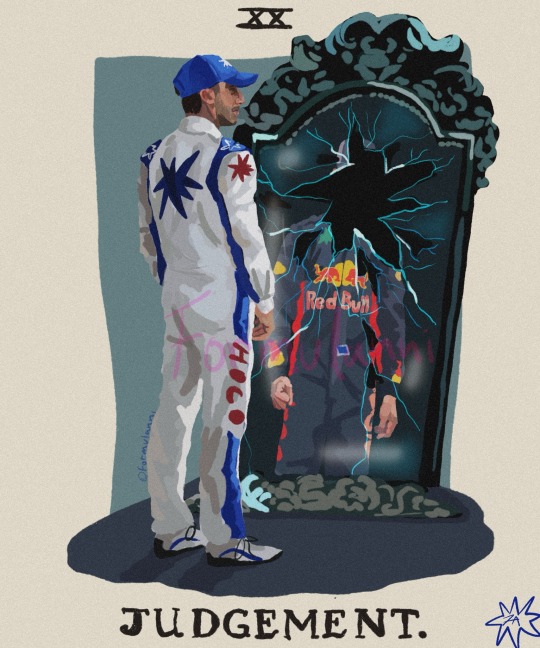
Daniel Ricciardo as Judgement:
The Judgement tarot card symbolizes the arrival of absolution and the culmination of a significant undertaking, often related to past and life lessons.
Judgement indicates the cusp of rebirth.
In order to achieve that, you must look back upon your deeds and come to an honest evaluation of yourself. This leads to the awakening that signals a new way of life.
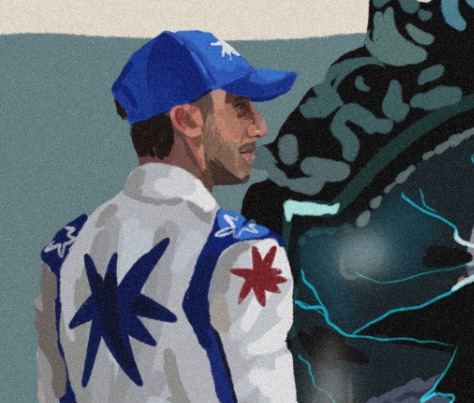
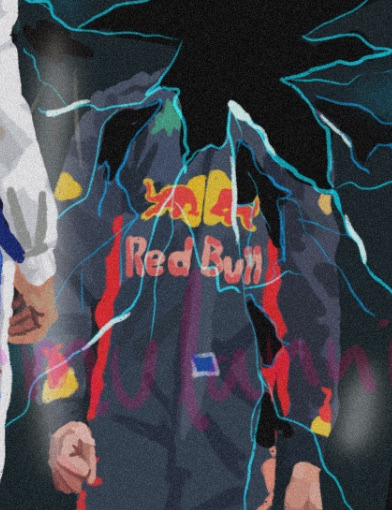
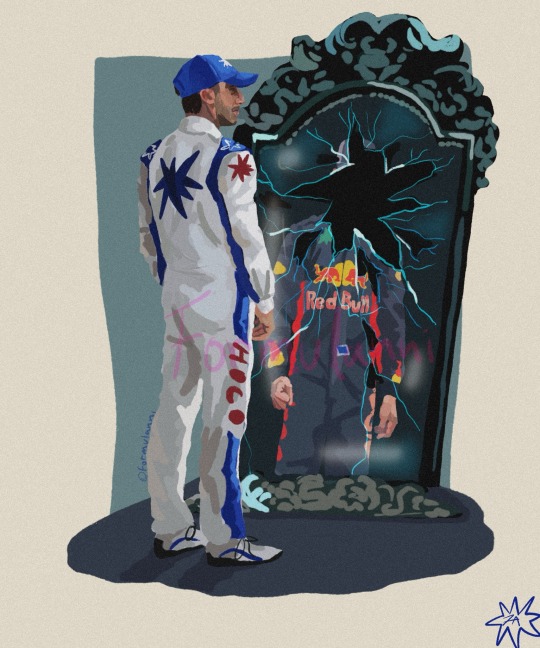
Tag list: @st-leclerc @rubywingsracing @saviour-of-lord @three-days-time @the-wall-is-my-goal @albonoooo @ch3rubd0lls
#I’m not gonna lie to u this one doesn’t feel good 😭#I was hoping to get this out b4 he got booted bc now I just feel like I’m rubbing salt in the wound 😭#sorry to the dr3 fans that will see this#I chose this card for him back in April 😭#um. basically.#I think this card is him#mainly due to his bad career choices#but ESPECIALLY bc (when I picked this card) he was reevaluating past mistakes and attempting to get back to redemption#in this case redemption is Red Bull#so here he is evaluating and coming to terms with the misstep#when I chose this I was still a big dr fan and I was hoping that the end of the card would come true#and that this would lead to vibrant rebirth and prosperity#lol#once again I’m so sorry I know this is bad timing it FEELS bad but like…. it was now or never#and he was also the only major arcana card left that I’m drawing a person for#f1#formula 1#f1blr#f1 fanart#f1 art#annie’s art#formula one fanart#formula 1 fanart#formulanni#dr3#daniel ricciardo#rbr f1#red bull racing#f1 tarot#judgement tarot
757 notes
·
View notes
Text
garak: you could never be Mother. you could never be that cuntress. your contour is messy and you’re still wearing the terok boots from 10 seasons ago
gul dukat, veins on his forehead bulging and on the verge of tears: i slay! i slay!
#this is in the middle of ops btw#i think that they’re saying this in cardassian but the UT is translating it like this#um. i’m sorry#gul dukat#garak#ds9#gul dukat: it’s vintage!!!!#garak: more like outdated. just like your fashion sense#garak goes on and on until dukat can’t talk back bc all he can say at that point is the f slur
2K notes
·
View notes
Text
i feel like poolverine easily could’ve been one of those “they’re flirty but it’s mostly unserious” situations, and for most of the movie yeah they were extremely gay, but wade’s been like that with other guys and it was never treated as a serious type of relationship before. they’re willing to die for each other, but even then the romantic aspect of their relationship could be glossed over because it’s a superhero movie, that’s just what they do, and they’re working together to save a whole timeline—it’s not just about them. but then the movie doesn’t end with them saving the day and moving on. i think this’s really the part that sells poolverine as a genuine relationship to me… logan’s leaving, and wade calls for him. he can’t stand to let him go. then he introduces him to his family, and logan stays. he doesn’t really need to stay, but they’ve both decided they’re better off with one another than without
#don’t get me wrong#wade and vanessa are going to end up back together again if there’s ever another deadpool movie#and then he’ll lose her again for whatever reason#because that’s just how it goes#ignore the fact that logan tells wade to talk to vanessa and i’d be convinced that the ending was supposed to imply them being canon tbh#not gonna delude myself into believing poolverine will ever be genuinely and seriously canon#but shippingwise#i think this’s why i’ve latched onto poolverine despite some of the similarities between cable & logan#with cable it was never gonna be serious#despite it being fun to ship them and enjoy their dynamic#but#with logan… storywise… it makes so much sense for them to be endgame#they both were at terrible points in their lives and really needed each other#not just to fix each other’s problems. but they needed someone who was so on their own level that they could fix each other#not in a healthy way. but#yknow#anyway#idk i’m kinda rambling about nothing here#deadpool and wolverine#deadpool#wolverine#wade wilson#logan#um#logan howlett#<- ….i guess#poolverine#deadclaws
501 notes
·
View notes
Text


My favorittte guy. Favorito. J’adore 😻
#dst#dst wilson#dst willow#dst maxwell#dst maxwil#willowson#my art#paper art#maybe he looks a little generic… I’m working on it#um um um sorry tf2 followers… I’ll get back on that…
204 notes
·
View notes
Text

Youll never guess what I started!!
While watching the first episode I forced myself to figure out how to draw rett and it paid off look at him!!
Avantris singlehandedly forcing me to learn how to draw men
Silhouettes because they look shockingly baddass, Barbie pyke because Jesus do not leave his hair unrendered, and the sketch because I find it funny
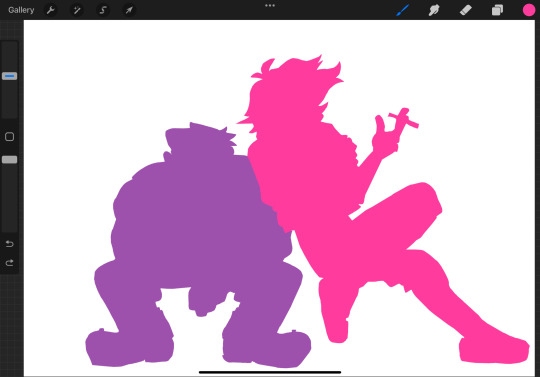
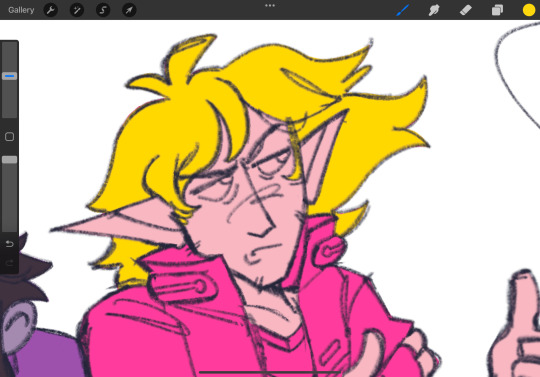

#my sketches for everything are always CRIMINAL#I should post them more#this one had various contexts so I’m gonna share them all and you can pick which one you like best and that can be canon in your mind#1: they’re pissed at eachother but gay people can’t be normal (codependency)#2: were not mad just disappointed#3: the crew is being shenanigan heavy and they need a break#Not to brag but#I need everyone to look at several things#pykes hair#the metal rendering#pykes shoes#and retts arm#thank you#anyways um I love stardust rhapsody expect more art to come#prelude come back#legends of avantris#stardust rhapsody#pyke stardust rhapsody#rett stardust rhapsody
291 notes
·
View notes
Text
ran is the type of lover who will bother you every second of the day. even if you’re apart, best believe he is spamming your phone with messages on different platforms. if you don’t answer your phone in five minutes you’ll usually come back to multiple different types of messages.
the first stage is the spam. he sends random stuff, sometimes consisting of only single letters just so you have a lot to scroll through.
the second stage is the guilt trip stage. he’ll send you pictures of stuff you’ve been practically begging for, saying, “i was going to buy you this, but i guess you don’t love me anymore.”
then, the final stage of grief. he sends multiple sad songs about breakups, claiming that they reminded him of you (it’s literally been 3 minutes; calm down, ran). good luck getting to send anything but sad faces after the grief stage. the only way to cheer him up is to go over to his house for a quick cuddle session and a nap.
#hi i’m back with a longer one#um#hope u enjoy#ran x reader#ran haitani#haitani ran#tokyo revengers ran#tokyo revengers x reader#tokyo rev x reader#tokyo revengers headcanons#tokyo rev headcanons#tokyo revengers imagines#tokyo rev imagines#haitani brothers
495 notes
·
View notes
Text
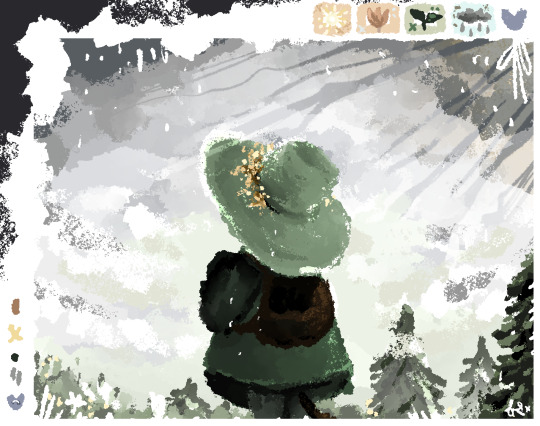
Last view before a late arrival
#Hi hi hello Moomin fandom the Moomins hyperfixation/special interest is setting back in slowly I can feel ittttttt shajfhdsjfh#Moomins#my art#Moomin#Snufkin#moominvalley#kind of?? He’s on a mountain peak overlooking Some Valley but I’m uncertain if it’s that one quite yet#he’s just enjoying the rest of his time alone before he returns soon (and late)#Right I can’t remember any more tags uhhhhh#Oh um#id in alt text#And hehe a little very vague alluded to snufmin symbolism#But anyway#yay hi
264 notes
·
View notes
Text
The TTPD Deep Dive (Part ?)
It’s no secret that I have a lot of Thoughts about The Tortured Poets Department and it has lived rent-free in my head since it came out earlier this year. I’m absolutely blown away by how underneath the chaos, it’s actually an exceptionally cohesive story and is probably the closest to a concept album Taylor has ever done.
There are so many themes that have stood out to me over the last five months, and there’s one in particular that I think not only drives the entire album, but ties into previous albums to help deepen understanding of it.
This is it, my fangirl magnum opus, my months of posts consolidated into one place. This is also my disclaimer that this is just my interpretation of the album, and my summary of the story it tells, and I don’t pretend to have any special insight or authority. I’m not saying I’m correct at all, do not take any of this as fact, it’s just what it sounds like to me, and these are my silly not-so-little thoughts about it.
(Under a cut because it’s way too long and involves discussion many may not care for or be sick of.)
Come one, come all, it's happening again (I'm thinking too hard about Taylor music)
The overarching theme in TTPD to me is: Grief. If you’re looking at TTPD as a story being told (instead of just as someone’s real life), the inciting incident of TTPD is loss, and the grief from that loss is what drives the narrator’s actions and the fallout, as well as unpacks those complicated feelings and how they apply to the her life in general. By the end of the standard album, it’s also about recovering from that pain, moving on from it and learning from it.
The loss specifically is the loss of the dream of having a family (with one’s partner). One thing that is abundantly clear both on the top line and under the surface in TTPD is how Taylor (as a person and as narrator) longed not only to for marriage but specifically parenthood, and the fear and then realization of losing that chance absolutely wrecked her— which is why the next lover’s (the conman's) wooing worked so well, because it preyed on that yearning. Yet that loss also dovetails into the grief of many things: of youth, of idealism, of relationships, of ideas, even of self, which causes almost a deconstruction of a belief system to piece one’s life back together by the end.
THE CONTEXT
TTPD weaves in the topics of marriage and motherhood both explicitly and in the subtext, in various forms and scenarios. The cheating husband in “Fortnight.” The wedding ring line in “TTPD” the song. “He saw forever so he smashed it up” in “My Boy Only Breaks His Favorite Toys.” All of “So Long, London.” Running away with her wild boy in “But Daddy I Love Him,” fantasizing about weddings and joking about babies. The imaginary rings in “Fresh Out The Slammer.” The cheating husband (again) and the friends who smell like weed or “little babies” in “Florida!!!” “You and I go from one kiss to getting married,” “Talking rings and talking cradles,” and “our field of dreams engulfed in fire” in “loml.” (And arguably: “I wish I could un-recall how we almost had it all.”) “He said he’d love me all his life, but that life was too short,” in “I Can Do It With A Broken Heart.” They may not sound like much on their own, but they paint a picture about how the topics pervaded her thoughts and her writing, and in many cases express her desires, and her pain.
It’s something that goes back several albums when you pick up on context clues. You get the first hints on Reputation with “New Year’s Day,” and “you and me forevermore.” Then Lover is very forward with it: “Lover” is basically wedding vows, “Paper Rings” is very engagement-coded, “I Think He Knows” is cheeky but low-key “you better put a ring on it,” “It’s Nice To Have A Friend” has wedding/marriage imagery in the last verse. As a self-professed diaristic writer, it’s the type of stuff one presumably doesn’t put out there unless those conversations have already happened, and she was very excited about it at the time it was released.
Then the pandemic happens and folklore comes out, and while there is still happy love there (“invisible string”), there are also the first indications that something has happened to put a halt to whatever future she once dreamed of (“hoax,” “the lakes”) and that she’s trying to reassure herself and him that it can still happen even if she’s scared it might not (“peace”). Notably, as far as I can remember it’s the first time Taylor explicitly brings up the idea of family (with her partner) with “you know that I’d give you my wild, give you a child,” which stood out at the time because it’s so incredibly vulnerable, but it’s even more poignant when you really take in that the whole song is like a confession of her deepest worries, and this is her vowing to give him these things that she holds most sacred if he’ll let her. These are what she cherishes most dearly and wants to return in kind: her youth and commitment (my wild), the family she craves (a child), unconditional support (swing for the fences/sit in the trenches) and understanding/compassion (silence that only comes when two people know each other).
Evermore follows an even darker path, and suddenly the album explores relationships that end and grappling with loss. There are toxic relationships (“tolerate it”), dangerous marriages (“no body, no crime,” “ivy”), failing/broken relationships (“Coney Island,” “champagne problems,” “happiness,” “‘tis the damn season”), as well as grief (“Marjorie,” “evermore”). Even some of the happy songs have uncertainty in them: in “willow” she’s begging for him to take her lead, like she’s still trying to decipher him and ask him to commit; in “cowboy like me,” still a beautiful love song, she’s thinking, “this wasn’t supposed to work and we were supposed to bail on each other but we fell in love instead”; “evermore” is about the depths of severe depression (and more) with the love story being the one saving grace in her darkest hour. And it’s also notable that after all the “fiction” writing, shortly after this album she writes “Renegade” where she’s telling the subject: I’m ready to start the next phase of our life now, why aren’t you? Is it me you don’t want after all? It’s like there’s something telling her that this stall might not just be a stall.
Midnights is a jumble (in a good, but in hindsight, also sad way) with the “sleepless nights” concept, but it seems pretty clear now that the themes and events and relationships she was revisiting tied into a lot of what she was feeling in her present life. I wrote the cliff notes version awhile back, but she’s questioning so much of her life that’s reflected in past events and relationships. Am I actually always the problem? How did we lose sight of each other and what we had? We only seem to work when we block out everyone and everything else. Can we ever go back to when things were good? Why are you neglecting me? I once thought I was going to lose everything but you saved me in the nick of time, can that happen again? I chased my career, but did I give up my chance at having a family in the process? Nobody knows what I really suffer from behind closed doors and I’m all alone.
And so on, which in retrospect now that we have TTPD, is very much what she was grappling with in private while writing and releasing the album. The inspiration behind the songs may have been different events and muses, but regardless of their origins they all end up feeling too familiar, like she's seen this film before (ahem). We’re seeing her view of commitment change too, or rather how she writes about it: she’s not making the outright declarations of it like on Lover, or even the implied ones on folklore, nor is she talking of the dark side of it like evermore. For the most part it’s a return to the early days of some relationships, before things got hard, or the end of them when there was nothing left, and also pushing away the discussion of it altogether by the outside world. “Sweet Nothing” is a sweet slice of life, but even at that, it’s the peace of the home in conflict with the pressure of the outside world. Now that we have “You’re Losing Me,” which was written at the same time as the rest of the album, we can probably deduce that she was going back to the start because something happened that made her doubt the future.
THE SETUP
So much of Midnights directly ties into TTPD, and I said in the post I linked that it’s like Midnights is asking the questions that TTPD answers. But there’s one song in particular on Midnights that sticks out to me as being key in the broadest sense to understanding the state of mind that led to the events of TTPD, and that’s “Bigger Than The Whole Sky,” because the way it expresses grief is reflected in the theme of mourning a life built and the dreams along with it that are never realized in TTPD. There are several instances in TTPD that are basically variations of: “every single thing to come has turned into ashes,” and that’s what makes her snap, and leaves her vulnerable to someone who promises her those things when she’s bereaved at losing them in the first place. (In other words: “the deflation of our dreaming leaving me bereft and reeling.”) The song tells a story about how that loss of hope colours one’s entire mindset, and in some ways is a bridge to TTPD to understand what such a low point feels like.
I think that that grief, and most importantly losing hope for an imagined future in its wake, is fundamental to understanding TTPD on so many levels: both the decline with one partner that kept her hanging on then led her such a dark path, and why she fell for the conman's apparent bullshitting because it offered an express pass to what she was losing with her partner. And I also feel like it plays a part into the ruminating she’s doing all over Midnights, trying to make sense of where she finds herself when she’s writing the album, which directly leads to “You’re Losing Me.” Loss permeates so many of the stories on Midnights: of lovers, of innocence, of youth, of faith, of control, of life’s work, etc. “BTTWS” is just one of the ways in which it is expressed so fully, capturing that deep depression and subsequent extinction of faith in something that once felt assured and very much wanted. (Which is also mentioned in her writing process in the “Depression” playlist on Apple Music.)
If you understand why that feeling of loss in general across so many parts of life is so important to Midnights, then it illuminates so much about the “narrative” in TTPD too. If on Midnights she’s wrestling with the seeds of grief and loss (on multiple fronts), TTPD is her reckoning with it in its full form. “So Long, London” is the song that is the most explicit about it: How much sad did you think I had in me? How much tragedy? Just how low did you think I’d go before I’d have to go be free? You swore that you loved me, but where were the clues? I died on the altar waiting for the proof. It’s the sequel to “You’re Losing Me.” It’s, the air is thick with loss and indecision, I know my pain is such an imposition, I’m getting tired even for a phoenix, all I did was bleed as I tried to be the bravest soldier, I’ve got nothing left to believe unless you’re choosing me, my heart won’t start anymore, but from the other side of the break.
This is highly speculative, but if you follow the thread about the topic and the relationship as told from Rep through TTPD, in broad strokes it goes: young love with a serious connection (Rep) -> growing up and making life plans (Lover) -> something happens that delays those plans or makes them grind to a halt (folklore) -> serious doubts arise and cause a loss of faith in their future (evermore) -> struggling with the loss of that future and trying to make sense of the problems in a last ditch attempt to save the relationship (Midnights) -> fallout from that grief after the blowup of the relationship (TTPD). Understanding that progression of events (through the music) explains not only the storytelling side of TTPD (e.g. the jump from the partner to the conman) but also how the experiences/muses blend in the music, and how the music that on the surface is about the short-term relationship is really driven by the destruction of the long-term one.
Following the music, it’s IMO implied that Taylor (the narrator) was holding out for marriage and family with her partner, for years, and it seems like it was at one point a shared dream until something happened to pump the brakes, and seemingly on her partner’s end. And extrapolating further, given how the sorrow expressed in former albums bleeds into TTPD, it sounds like a plan that had been concrete in some form before it had fallen apart, and losing something that once felt so tangible is what drives her in her grief to find any kind of respite from the pain. Which is why the situation with the conman becomes so appealing as the one with the partner splinters further and further.
(If everything you’ve once touched is sick with sadness and you don’t want to be sad anymore, what are you left to do?)
THE STORY
So (one part of) the story kind of sounds like this from the standard album: the relationship with her partner as well as his mental health slowly deteriorate and he withdraws emotionally (“London,” “Fresh Out The Slammer”) and physically (again, “London,” and “Guilty As Sin?”) and takes his resentment out on her (“London” and arguably “My Boy Only Breaks His Favorite Toys” even though I don't want to get into muse speculation here). As she sinks deeper into her own depression as a result, the weight of the failing relationship starts feeling like a cage— or a noose (“London,” “Guilty”), but coming to terms with the loss of their life together and the future they’d dreamed of was killing her (again, “London,” but also “I Can Do It With A Broken Heart”).
Enter the conman who she reconnects with at the very point where this is coming to a head (knowing that IRL she reconnected with him around the time Midnights was being worked on) , and if you read between the lines, she confides some deeply personal things to him (“Down Bad” and “hostile takes overs”/“encounters closer and closer,” “Smallest Man” and the entire sleeper cell spy imagery which is one of my favourite things and I could write a whole essay about the meaning of it, “loml” and “A con man sells a fool a get-love-quick scheme”). Then after she’s confided these secrets to him, he insinuates himself back into her life (“Guilty,” “Down Bad,” “Smallest Man”) and sells her a dream that HE can give her all these things she hopes for (again, “Down Bad,” “Smallest Man,” “loml,” song “TTPD,” “Broken Heart”).
But the thing is, he only knows these are the things she wants because she’s revealed it to him, and presumably, told him that was what she was losing by staying with her partner. And instead of the normal response of, “that is really sad that your partner is not supporting you and you deserve to be treated better,” to a friend in growing distress, it seems like it was, “well I can give you all those things!!!! Right now!!!! Trust me!!!!” And worked on her until she believed it, and jumped at the chance at a precarious time in her life. And one thing I want to underscore is: Taylor has agency in the situation always, it’s not like she’s been kidnapped and brainwashed. (In fact, she implores on songs like “But Daddy” that SHE is in charge of her own choices, good or bad.) She chose to rekindle the friendship and then relationship, and she chose to eventually leave her long term relationship for another man, and she reiterates on the album that she owns this all. But it’s also: nothing exists in a vacuum, and she makes choices based on emotions and information she has at the time, which is why it gives so much whiplash.
THE ALBUM
When you look at it as, the situation with the conman only happens because of what happened with the partner first and that the appeal of the conman and the fantasy he sells her is a direct reaction to that, it makes the “swirliness” of the music make so much more sense. And for much of it, even many of the “conman” songs on the surface are really “partner” songs underneath.
Fortnight
A suburban gothic allegory about a broken marriage with a distant husband with a wandering eye, which makes the rekindled romance with the neighbor so appealing. She’s miserable caged in her stifling house because she’s been abandoned by her spouse, so the reappearance of this past love reignites the passion that’s dead at home.
TTPD
“So tell me, who else is gonna know me?” “I chose this cyclone with you.” I’m gonna kill myself if you ever leave. Everyone knows we’re crazy. She’s laying it out there that she’s already in a dangerous state of mind, and she’s actively putting herself in more danger by pursuing the conman. “At dinner you take my ring off my middle finger and put it on the one people put wedding rings on, and that’s the closest I’ve come to my heart exploding,” spells this whole thing out so clearly: whether it’s an actual event (likely) or a metaphor for the promise he makes to her, the reason why it makes her heart explode is because it’s the thing she’s been waiting for forever with no movement, and here this person comes in and slips it on her finger in an instant like it’s nothing. (And eventually, as we’ll come to know, it is absolutely nothing to him.) You mean it could have been this easy this whole time?! (Well, no. Not until a certain other suitor makes his appearance later.) It feels like she’s finally getting everything she wanted in the blink of an eye! How lucky! How convenient! What was that about the get-love-quick scheme you say? (Unsaid: the reason why this feels so urgent is because there’s a sense that time is running out in so many aspects of her life and not just the obvious. Which reappears later on.)
Down Bad
“Did you really beam me up in a cloud of sparkling dust just to do experiments on?” sets the scene for this euphoric experience in the moment that starts to feel violating once the dust settles (which is then followed up in “Smallest Man” and the spy mission on her). The bridge spells out how he weaselled his way into her life, preyed upon (intentionally or not) her emotional state, sold her a dream and then vanished, without the benefit of hindsight yet we see later in the album.
The alien abduction metaphor is pretty brilliant, because it shows both how she was desperate to escape the place she found herself in, and how much it screwed her brain to then be left stranded when the affair was over. “[I loved your] hostile takeovers, encounters closer and closer,” is so evocative because it details how the situation came to be: his overtures under the guise of friendship blurred lines until he made her an offer that she eventually couldn’t refuse (hostile takeovers) as he infiltrated her life more and more intimately. The sad thing is that the song has parallels to how her relationship with the partner started too in earlier albums, in that they ran away to live in their own bubble (or planet) only for him to metaphorically abandon her as the years went on. (Oven, meet microwave.)
My Boy Only Breaks His Favorite Toys
Being continually emotionally broken down by a person who knows he’s hurting you but still acts the way he does. (The original voice memo version makes this even clearer and it’s rather heartbreaking.) “He saw forever so he smashed it up,” speaks to the loss of a future the person became scared of, and the original lyrics (“he saw forever so he blew it up”) somehow cut even deeper to me because it feels so much more intentional.
Also in the original version, “he was my best friend and that was the worst part,” also speaks not only to the loss of an entire partnership in the wake of this hurt, but also to the feelings of betrayal that the person you trust so deeply has the ability to hurt you in this way too, and how it’s a one-two punch of not only losing the relationship but also your closest confidant. (It’s like the sequel to “Renegade” and the missiles firing to me.) Again, there are shades of both/many situations in the song, pointing to an unfortunate pattern in some ways. The situation in “My Boy” is part of why she was so low, and why the “get love quick scheme” was so appealing later on. And it dovetails nicely into…
So Long, London
The most explicitly “partner” song that puts a coda on “You’re Losing Me,” and is Track 5 because it’s the emotional underpinning of how she got to where she was, and drives the events of the rest of the album. It spells everything out: He withdrew, she tried to fix it for both of them, eventually even that stopped working, he was oblivious to or minimized how badly she was suffering and his (in)actions couldn’t reassure her, he wouldn’t move forward on their future plans and stewed in his own struggles, she was spiralling out of control trying to hang on and ultimately felt like she was going to die if she didn’t leave.
But Daddy I Love Him
Like a direct reaction to “So Long, London” in that she breaks free from the death of one relationship and throws herself with reckless abandon to the next, fuck the haters. How dare you judge me, when the relationship you think I should have stayed in was killing me? (Dutiful daughter all the plans were laid. All you want is gray for me.) Fuck all of you, I’m going to choose whoever I want! (So what if I have a baby with HIM, huh?! I tried doing it the proper way and look where that got me so now we're back to square one) It’s again her imagining how wonderful and freeing this “wild boy” is going to be for her, and how wrong she’ll prove everyone. THIS TIME she definitely got it right. So what if she has to run away! So what if she scandalizes the whole town! They don’t know what she really wants or needs anyway! She’s the only one of her (hee-hee-hee) and she’s the only who gets to decides how this goes. (Because: she longs for control in a situation she’ll eventually realize she has little of it in, which we’ll find out is a recurring theme in her life.)
Fresh Out The Slammer
Also spells out what happened with the partner in the first verse and the pre-choruses, which is what makes the conman so appealing as the imagined jailbreak. The bitter loneliness vs. the sultry passion she builds up in her head as she awaits her release from prison is key to understanding the two sides of the story in the album. There’s this whole outlaw imagery (which is also carried through in “I Can Fix Him”), but it’s contrasted in the end with her and her reunited lover sitting on park swings like children with “imaginary rings” — because “Ain't no way I'm gonna screw up now that I know what's at stake.” What’s at stake is lasting love and the promises that come with it (marriage/family) that are precious and time-sensitive. The imaginary rings are both a nod to the youthful dreams of her and her new/old lover, but also has a double meaning to me because those promises aren’t built on anything together; they're made up, intangible. (They’re no more concrete than the plans that went up in smoke with the partner.) Like with most of the conman situation, it’s all a fantasy in her head that has yet to happen, and as we find out later in the album, reality ends up leaving much to be desired.
Florida!!!
Broadly speaking, it’s running away from your problems and wanting to disappear from your life. (But again: the life she’s disappearing from is the cheating husband she may or may not be feeding to the swamp-- another miserable marriage.) What kind of flies under the radar though is the “I don’t want to exist,” line, which points to her dire state of mind that led her to fleeing to that metaphorical timeshare down in Destin. In many ways about cheating death.
Guilty As Sin
Yes it’s the “masturbation song,” but again the nuance is that she’s left to pleasure herself because her partner has abandoned her emotionally and even physically, i.e. “my boredom’s bone deep.” To be blunt: they aren’t even intimate anymore, so she starts fantasizing about the guy she used to have chemistry with who’s reentered her life and is making moves on her. And realizing that she’s now finding release in another man (albeit imaginary) breaks her even as it reinvigorates her because she finally understands that the relationship she’s in is effectively dead. (“Am I allowed to cry?”)
Who’s Afraid of Little Old Me
This isn’t about relationships, but about society and its reaction to them in a general sense. But again, she’s left to stew in all this anger and hurt as she’s been abandoned at home, then abandoned by public opinion, and the public attack on her is part of the origin as well as the end of that story. The trauma inflicted upon her detailed in the song is the reason why she felt trapped in the first place, which led to the decisions she’s made and habits she’s leaned on ever since.
I Can Fix Him (No Really I Can)
This is one of the few songs that is the most completely conman-coded, and shows when the delusion finally breaks at the end of the song. She spends the whole song being like, “no really, I alone can make him better! You’ll see! I know he’s gross, but he’s mine! It’ll be fine I swear! You don’t know anything! Uuuuuum hmm wait actually what the fuck—“
Loml
Oof. THE song. Again the surface reading is about the “conman” who comes in and sells her the lie, but the pain is because all the dreams she writes about are HER dreams and implied that they were the dreams she built with her partner that the conman sold back to her. I could do a deeper dive on this but most of the song is applicable to both relationships, which not only shows the “swirliness” of her writing, but also how they both ultimately did the same thing to her in different shades.
The bridge and the last chorus are kind of fundamental to understanding it all, and her ending it with “you’re the loss of my life” is about, among other things, how falling for this trap blew up the life she built and dreamed of for good. (I could talk about this one forever.) “You shit-talked me under the table, talking rings and talking cradles” to “Our field of dreams engulfed in fire” is a hell of a line and progression, and again, indicative of what the real driving force behind the whole album is. The shit-talking is because he took her dreams (of marriage and children) and hyped it back up to her tenfold whether in a moment of his own delusion or for more nefarious reasons — much like how the man prior kept promising these things but never followed through, which left her vulnerable to someone who appeared to offer them enthusiastically. The field of dreams isn’t just the one with the conman, it’s the one with the longterm relationship she’d built the dream with in the first place, because the conman’s actions are part of the reason the LTR went up in smoke. (Not the reason for the rift, but the consequence of the final break.) And THAT is why it’s the loss of her life, so completely.
When she says “I wish I could un-recall how we almost had it all,” IMO it’s not just the fake future that the conman lures her into, but also (and perhaps mainly) the once-real one she had with her partner and the loss of which that made her susceptible to falling for the con in the first place. There’s honestly so much between the lines in this song that covers every theme and speaks to the grief of seeing the life she imagined slip away, slowly by the first man then annihilated by the second.
I Can Do It With a Broken Heart
The juxtaposition of “He said he’d love me all his life, but that life was too short” and “He said he’d love me for all time, but that time was quite short” sums it up to me (and parallels “loml”), because they are two different situations, but they cut her just the same. In the first, “that life” IMO was the life they’d built with the dreams that went along with it and it was too short because he never followed through, and in the second, the “time” was quite short because it was the frenzy of the whirlwind romance that fizzled as quickly as it began. The life that was too short led to the time that was quite short.
The Smallest Man Who Ever Lived
This is definitely THE conman song. The rage, the shame, the violation, it’s all in there. But the key to it is the bridge and the espionage imagery woven through it. A honeypot scheme is when spies target a mark and seduce them to gain their trust and their privileged information for their homeland. So her likening him to a sleeper cell spy who set her up just to mine her deepest secrets and use them against her is a heavy, loaded statement. And implied: that valuable information she unknowingly held were her longings of marriage and family (the aforementioned shit-talking about rings and cradles she never got to have), and more importantly, those dreams preceded him reentering her life and then beginning his mission on her.
The insinuation then is: she confesses these are her deepest wishes which are now seemingly unattainable in her current situation (e.g. with her partner) -> he convinces her HE will give them to her and make the dreams she pines for come true -> she falls for him and blows up her life to make it happen -> he gets what he wants (thrill of the chase/sex/the idea of her/whatever his intent was) -> he abandons her when he gets what he wants, or rather it isn’t what he wants or can handle -> she’s left a) all alone b) with dreams unfulfilled c) with no answers d) feeling used at having her most sacred wishes used against her.
Again, the song is unquestionably about the way the conman absolutely destroyed her, but he was able to do that because there was this thing she wanted more than anything, that was dying in her previous relationship, that he was able to prey upon to seduce her, then discarded her and her dreams as soon as it was inconvenient for him while absolutely hollowing her inside out. (And again: the devastating thing is that this also applies to other relationships she’s written about, in different ways.)
The Alchemy
Not about either the partner or the conman directly, but it (loosely) touches on her finding herself after the whole oven-to-microwave experience and opening herself up to life and love again. #GoodForHer
Clara Bow
This isn’t about the romantic relationships on the surface, but it is about how damaging the entertainment industry and public life are on women, and how women are only valued for their beauty as commodities until they can be discarded and destroyed in the process. Which I think plays into the circumstances that led her to make the decisions that she did years ago, and why she makes the ones she does now. (But also, being valued for physical traits and appeal for the male gaze brings us to…)
The Manuscript
The “original sin” that kicks off all of this. Again, at first light this isn’t about the partner or the conman, but the person it is about is the reason why she has made all the decisions she has ever since in relationships (and that’s Mr. Plaid Shirt Days from “All Too Well”). The realization that her first serious adult relationship is what cemented these patterns, and this view of herself and her worthiness in relationships, is profoundly sad. An older man who valued her for being so mature for her age and implying that the mature activities ahem associated with that were the performance benchmarks in her ability to carry a relationship, only to leave her, was earth shattering. She placed her faith in this person, but then the way he treated her changed her view of love and of herself.
She took his innuendo about “pushing strollers” as a sign of potential commitment, whereas he ultimately meant it as foreplay, and she was too young and naive to know the difference. So not only did she learn from that that this man (and men) didn’t view commitment and family the way she did and that it was something to be toyed with, but she also learned that her value to them among other things was sex. Imagine being an idealistic 20 year old and your boyfriend ten years your senior tells you, “if the sex is anywhere near as good as our dates have been, we’re going to be making babies before you know it,” (e.g. this is relationship is serious) and then he dumps you: does that imply that the sex was not in fact that good? (E.g. that you’re not worthy after all?)
No, obviously from this side of life, it’s because he was a commitment-phobic playboy, even if he did love her, but she couldn’t have known that at 20 and instead internalized that shame. But, it did send her on a path of how she approached sex and love and relationships for over a decade afterwards. And her coming to the realization that that first act of (perhaps unintentional) manipulation is what informed her actions thereafter helped her break the pattern. Her worth to men is not just sex, she has value and her hopes and dreams have value, she doesn’t have to change into a different person to please anyone, because if that is what they want, they won’t ever want her anyway.
It’s been described here on Tumblr by people more eloquent and astute than I as a song that encapsulates the album as this: one did it slow (partner), one did it fast (conman), and one did it first (first love)— and that is haunting. After years of men minimizing her dreams and desires, if not outright using them against her, she’s finally at the point where she can let it all go and move on for good. (There’s a whole other tangent about consent and shame and manipulation, but that’s an entirely different kind of discussion. But it is so devastatingly contrasted with “you said if we had been closer in age maybe it would have been fine, and that made me want to die.”)
THE SUMMATION
This is just my interpretation of it, but in going through the standard album, it feels pretty clear how cohesive the album is about a story of love and loss and grief, then reckoning with what caused it all in the first place that set a person on this path. It’s a formative experience at a young age that was traumatic and led to certain coping mechanisms and a shaping of one’s self-perception, as well as the reaction to external pressures that try to dictate behaviours and influence how one feels one deserves out of love which makes it harder to know when one absolutely deserves more and better. And leaves one struggling to cope with loss when there isn’t anything else to hold onto. Then in light of one’s life blowing up, learning to find oneself in the aftermath all over again.
On another tangent that is somewhat related to the theme of loss, the way she writes about the two main muses on the standard album also ties into how the situations converged to create absolute carnage on her emotional and mental well-being. With one situation, she’s talking about a concrete life that crumbles under the weight of their struggles; with the other, the entire thing is a fantasy that she builds up in her head, and when it comes to fruition it falls far, far short.
If you look at the “microwave” (conman) relationship, you realize that almost everything she writes about it happens before it actually becomes reality, and it’s mostly her imagining how great it’ll be, but with few exceptions, when she writes about what actually occurred, it doesn’t even come close to living up to her expectations. “Fortnight” is an imagined future where she escapes to Florida and his touch finally starts her stalled engine (ahem). “TTPD” is perhaps the most positive retelling of their time together, but even that implies he was better off stoned and when he sobered up he succumbed to his demons all over again, and more importantly she conveys how she also is in extreme distress, barely concealed by the veneer of being infatuated with him. (E.g. saying to that she’ll kill herself if he ever leaves her — the implication is that she is absolutely serious about it when she “felt seen.”) And that the warning bells are going off in her head, but she feels like this person is the only one she can be with (because they’re equally fucked up and the chaos he brings into her life makes her feel alive when she felt so close to death).
“Down Bad” is the most explicit about being in love, but she’s also left completely confused and disoriented by him disappearing, wondering if any of it was real and the seeds of violation creep into her consciousness (“did you really beam me up in a cloud of sparkling dust just to do experiments on?” “Waking up in blood.”). “But Daddy” is her imagining she can tell everyone to fuck off for telling her what to do with her life. “Fresh Out The Slammer” is her fantasizing about this man while feeling trapped in her relationship — but never in the song is she actually reunited with him; she’s using him as the projection of all the things she’ll make right after being wronged by her partner. “Guilty As Sin?” Is very obviously about her fantasizing about sleeping with him, but again it’s such a minefield for her because it hasn’t happened yet; they’ve only just reconnected. “I Can Fix Him” is the only song other than “TTPD” that shows them actually together, and it’s the one where she keeps saying, essentially, “I know he’s gross but I can rehabilitate him into an upstanding person, trust me,” until the mic drop at the end of the song where it finally hits her that no, she can’t, because this is who he is, not the person she’s built him up to be.
“Loml” is when it all comes crashing down, and the song emphasizes everything he did and told her, e.g. that she’s the love of his life, but she doesn’t return the sentiment in the song about their time together. Because now that it’s past tense, she knows it wasn’t actually love. (And says as much in the album epilogue poem.) “Broken Heart” is her reeling in the aftermath, but again, it’s “he said,” not “I loved.” And then there’s “The Smallest Man,” where she eviscerates him: he also pursued an idea of her but didn’t care much for the real her in front of him (who else is gonna know me?), he love bombed her only to hurt her (crushing her dreams), he was constantly stoned (and not just in the funny munchies kind of way), and he wasn’t even a good lover (despite the fantasy she’d created before). That last point is especially striking because she spent albums singing about the importance of and pleasure in (sexual) intimacy in the relationship with her partner (sometimes to both their own detriment) and how it was at times the only way they could connect, but in this case, the idea she hyped up and acted on in her head about this lover never panned out in practice. She spells it out in the epilogue: it wasn’t a love affair, it was a mutual manic phase.
In contrast, there’s a lot more tangible action in the “oven” (partner) parts of the album, showing how hard she tried to make the relationship work in real life instead of just in her head. All of “So Long, London” is her detailing how she tried to break through to him and support him, even when he rejected it and pushed her away, thinking she could carry them both until they ultimately sank, but she did it because she “loved this place for so long.” (The place? Not just the city, but the home and perhaps most importantly, him.) In “Slammer” she stayed with him even as things disintegrated for “one hour of sunshine.” (E.g. holding onto the rarer good times even as they were fewer and further between, hoping things would eventually turn around.) And like in “London,” she held on despite people in her life pleading with her that it was hurting her. (Which is also echoed in “Slammer.”) In “Guilty” her boredom is “bone deep” because the passion that once drove their relationship (and papered over their problems) has finally gone out too, so there’s nothing left to hold onto, leading to her fantasizing about the new suitor, which makes her realize her relationship has passed the point of no return. “Loml” is about the conman on the surface, but the undercurrent of all the things she says about him is that he was co-opting the dreams that she was clinging onto for dear life in the previous relationship, which is why the con is so painful; the field of dreams he sets ablaze isn’t just the fake painting he sold to her, but the original artifact (her life with her partner) too.
All the physical and emotional labour she puts into the relationship with her partner ends up reflected in the fantasizing she does in the one with the conman, which is why it is so confusing in the moment and so lethal when he leaves her without any answers. She wants to get married and start a family with her partner which keeps getting stalled; the conman mock-proposes which makes her think he’s immediately serious (“TTPD,” “loml”). She feels caged by having to hide with her partner and shrink herself; the conman promises he’ll stand by her side publicly and let her shine (“Smallest Man”). She sinks into a deep depression in her loneliness as the relationship with her partner careens off a cliff; the conman convinces her they’re meant for each other in a them-against-the-world way (“Down Bad”). The intimacy (in all senses of the word) in her relationship with her partner fizzles; the conman stokes the fire by sending her secret messages and reigniting passion (“Guilty”). She spent years trying to help her partner to no avail; the conman makes her think she has the power to reform him (“loml”). She feels misunderstood by her partner; the conman acts like he’s the (only) one who truly gets her (“TTPD,” “loml”).
In short: there’s nothing that the conman does or says that isn’t a direct response to what her partner did first, and it’s even worse because the conman knew how much her partner’s actions hurt her and he used that privileged information to paint a picture of what he could give her, but in doing so in some ways aimed at her heart with even deadlier accuracy. (I’ve likened it to him borrowing someone else’s life for his own joyride, until he crashes the rental car and flees the scene.) It’s why in the aftermath, the difference in emotions are so different: she feels nothing but rage and violation towards the conman for getting in her head and using her, whereas her feelings towards her partner are more complicated. There’s anger (at her lost youth and being taken for granted), but there’s also sorrow (at their lost life and future), disappointment (that he never could step up the way he’d promised or she’d needed), even compassion (towards his struggles) and a tiny measure of appreciation (for the good times they did share).
When you look at the bigger picture, the story the album paints is just so painfully normal. You have two people (Taylor and her partner) who once loved each other deeply, and despite warning signs early on telling them they have fundamentally different needs and ways of living their lives they fight like hell to make it work (the epilogue) until those warning signs become grenades that destroy their home (“My Boy,” “London,” “Slammer,” arguably “loml”). Having already been through at least one rough patch/break/breakup that she felt almost destroyed her (harkening back to Midnights on “You’re Losing Me,” “The Great War” and “Hits Different”), the final and fatal downward spiral of the relationship (“YLM,” “London”) and the grief over losing that future sends her into a tailspin, just at the time where a flame from the past (the conman) reenters her life and tells her all the things she’s been longing to hear and feel (“TTPD,” “Down Bad,” “Guilty,” “loml”) and, crucially, missing from the relationship that was once her entire life.
So in her panic, she falls prey to the (empty) promises of the past lover (“loml,” “Smallest Man”) and decides he’s actually what will save her from the free fall, because the alternative (that she will end up in a situation she doesn’t think she can survive) is too painful to bear. When she finally acts on these circumstances (leaves her partner/runs to the conman), she snaps, acting on pure emotion and adrenaline (“But Daddy”), but before she knows it, the new lover abandons her, and she’s left to reckon with the fallout of the episode and process everything that has happened (“Down Bad,” “loml”) — with the conman, with her partner, with the choices made in her adult life personally and professionally which leads her back to the moment she feels set her down that road at the start.
The TL;DR of this unintentionally long essay is that the reason the conman affair was so serious was precisely because it was meant to fulfill the promise of what was her life with her partner. To me, a large part of the story is that she projected that life onto the conman (or he projected her life back to her for his own purposes) because she wasn’t ready to deal with that massive grief and the life raft he offered felt like the only alternative to an even darker end. Whether the conman actually believed what he told her, or he went along with it or encouraged it because it served his purpose, we’ll never know, just like we’ll never know the finer details of what went on (nor should we). But no matter what, the album is just an extreme deep dive into all the ways grief can consume us, and whether it’s a long, drawn-out death or a sudden, inexplicable one, it can turn a person’s life into such a trainwreck that they act in ways unfathomable to even them, let alone the people around them. It can also unleash repressed trauma and mental illness that can crater your sense of self. And when those situations are compounded? It makes for a nearly impossible type of breakdown to unpack. (Which is why you might need a 31 song album to process it.)
#What if i told you I’m back lol#Time for me to finally just post the thing after it’s been sitting in my drafts for so long so I can rid myself of it lol#Writing letters addressed to the fire#the tortured poets department#Consider this a treat before Eras comes back for its swan song leg idk#Would you believe that as long as this is#i deleted quite a few chunks of it from the original draft i sent to a friend(s) in the interest of ~propriety~#Because they were a little too rambly and um— ~speculative~/personal/etc and we are flying too close to the sun#And i tried to be as tactful and more or less stick to things we can point to in the music and such#So hope people catch my drift lmao but also iykyk i guess#I have so many other themes I want to talk about but I never have any time#I have so much more i want to say and yet#wavesoutbeingtossed: The Anthology#Also if things get weird i will turn off reblogs/delete the post tbd#This is not an invitation to get into muse ranting or debate in my inbox and I ask that you please respect my boundaries :)#Midnights#lover#folklore#evermore
154 notes
·
View notes
Text
Coach Beard has a secret Traitors Club. It consists of himself, Nate and Jamie, ie people who have (at least in the opinion of one Willis Beard) betrayed Ted Lasso – but who have also learned the error of their ways through the goodness of Ted’s gentle heart.
(Yes, yes, you might argue that Jamie’s insulting remarks about Ted in 1x10 is a reasonable reaction to what, from Jamie’s POV, looks like Ted unreasonably dumping him, but a, I’m not sure that Beard knows that, and b, I’m not sure that Beard cares about that. You might also argue that Nate and Jamie have both learned a lot of stuff from people other than Ted, but: see the a and b of the previous sentence. And anyway, this is Beard’s club and you don’t get a say in his absurd selection criteria.)
Beard doesn’t inform anyone of the club’s existence. That includes the other members, Nate and Jamie, who just suddenly finds themselves regularly invited out for drinks with the most mysterious man either of them have ever met.
There are a lot of weird but oddly good talks about feelings. There are silences neither Jamie nor Nate know what to do with. And then there’s the football strategy chatter, which unites them all in a wild and eager frenzy, and an unexpected but pleasant sense of shared understanding.
Nate think it’s nice that Beard wants to hang and he’s not one to look a gift horse in the mouth anyway, so he doesn’t question the set-up. Jamie generally assumes that given the choice anyone would always choose to hang with him always, so. He’ll indulge his coach. They have a shared love of trivia.
Eventually Beard learns of Rebecca’s early transgressions, and (secretely) inducts her into the secret club. Club meetings get a whole lot more interesting from there on out.
#i love the idea of beard bonding with nate and jamie okay#without either nate or jamie grasping WHY this is happening#also#you can’t tell me their nights out with rebecca wouldn’t be a fucking BLAST#roy and keeley would BOTH be jealous#missing out on the fun#they’ll corner jamie and demand to know why HE gets to hang with those people#‘um i’m just great company ain’t i?’ jamie says#meaning every word#roy does not murder him#roy tries to force the truthout of beard instead#this fails as miserably as you’d expect it to#anyway back to the notion of beard and nate and jamie and rebecca going to karaoke…#which is where this ends up btw#jamie tartt#coach beard#nathan shelley#rebecca welton#ted lasso#my stuff
268 notes
·
View notes
Text
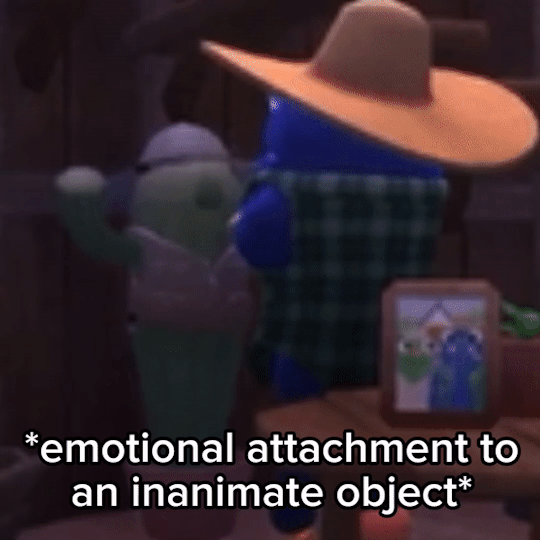
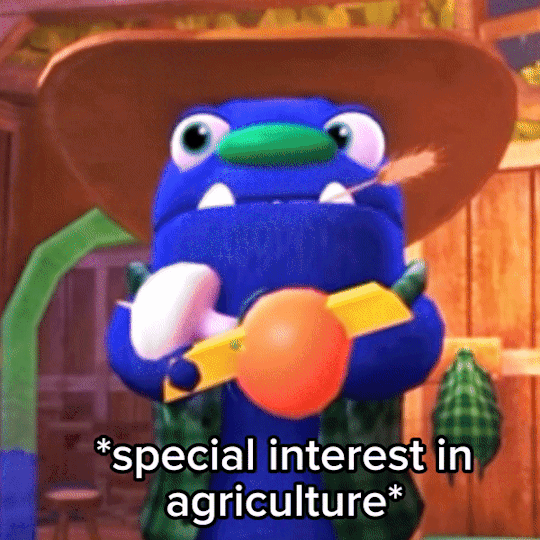
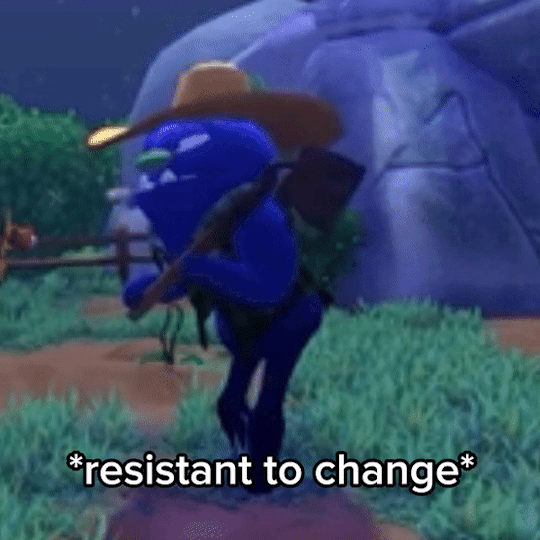
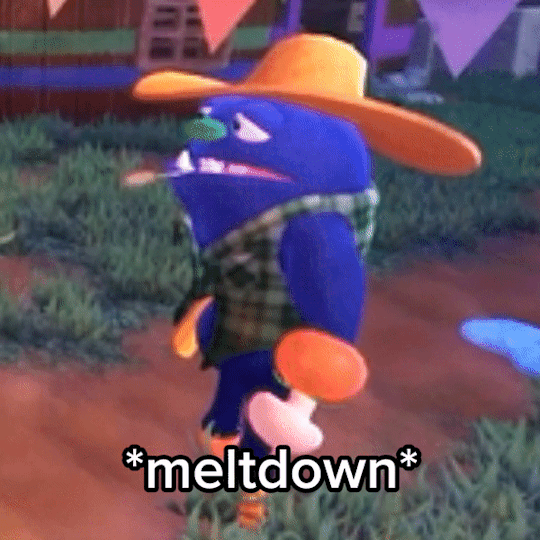


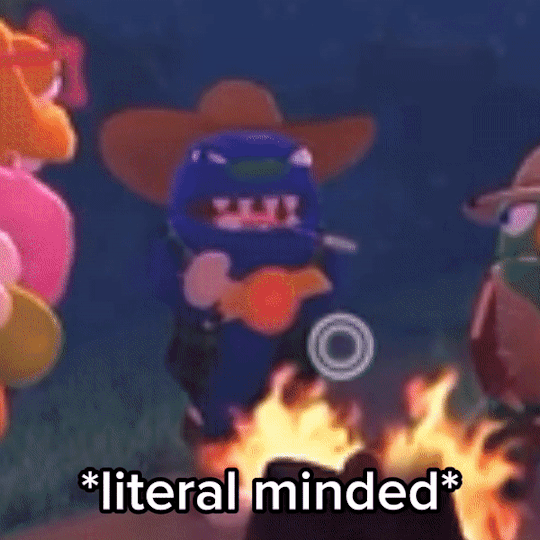
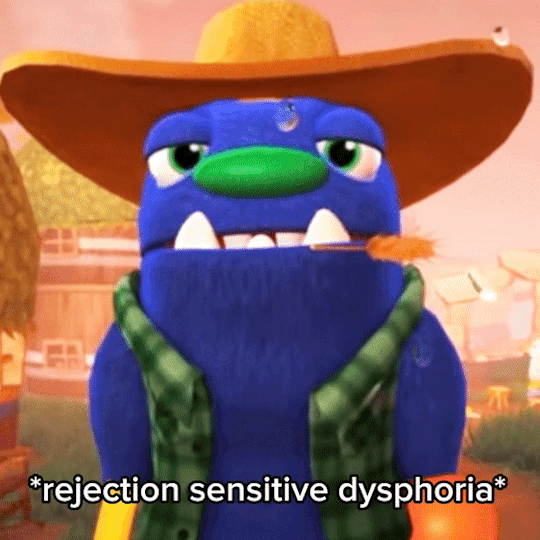
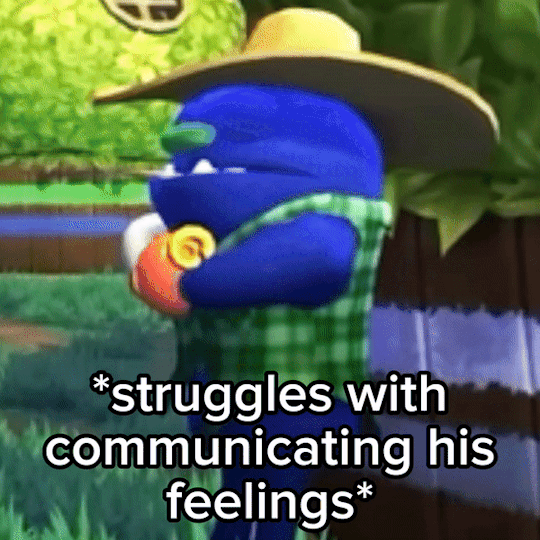
Autistic Headcanons: Wambus Troubleham (Bugsnax, 2020)
“I must look mighty foolish stickin' to my guns like this. But you don't give up just ‘cause things get tough. If nobody else believes in me, I gotta believe in myself.”
#bugsnax#wambus troubleham#bugsnax wambus#autistic headcanon#autistic headcanons#actually autistic#actuallyautistic#gif set#gifset#gif#🛠️.gif#to be totally honest I’m not super happy with the formatting#but this is the least horrible it looked so what can you do?#why is he looking to the left in half of the gifs… wack#I hope you guys know I fought for my life looking for good playthroughs for the ‘meltdown’ gif#I had to hear ‘y’all want Triffany back so bad?! go find her yerself!’ so. many. times#every day is hell… woe is me#this beast has been in my drafts since July and I only finished it now. um. whoops?
463 notes
·
View notes
Text
OK SO YOU KNOW THAT REACTION VIDEO THAT THAT PERSON DID OF SFTH
UM

so that happened-
#:)))))))#its 4:30 in the morning and I woke up and saw this now going back to sleep to hope it wasn’t a dream lol (/hj)#Wow#um#:)))#okay!?#idk what to say back#shoot from the hip#alexander jeremy#:))))#“@atjeremy replied” was not a youtube notification I thought I was gonna wake up to but hey I’m not complaining-
73 notes
·
View notes
Text
when people put monster high with other y2k nostalgia items im like
MONSTER HIGH WAS RELEASED IN 2010 IT IS NOT Y2K OR 2000s ADJACENT

#monster high#i’m sorry but monster high is literally My Interest#anytime someone gets anything about it wrong i have to hold back all my um actuallys
383 notes
·
View notes
Text
joe k/eery with a devastating head cold on instagram live was NOT on my 2025 bingo card holy shit
36 notes
·
View notes
Text


What the hell. This is not Splatoon.
#doodles#the sans one was a bit back . metaton was from . um. 2 minutes ago.#I’m not even rlly into undertale as of now first ones for a friend#second one was a realization that never in my life have I ever drawn Sans Undertale it’s very difficult. he is scary.#ahhh the skeleton 🩻 ahhh
117 notes
·
View notes
Text

Throw them off. post scroldara art
#doc brown#Clara Clayton#doclara#choonanigans#you guys aren’t getting context tumblr scary#I’m not very active because I’m always scared#Um I love you doclara and all your variants#YURIIII POWERRRR#bttf#back to the future
69 notes
·
View notes